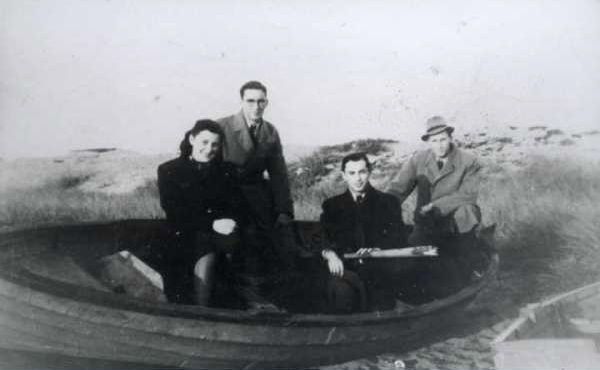Today marks the year of the 75th anniversary of one of the greatest triumphs in Danish history: the rescue of over 7,000 Danish Jews from Nazi persecution.
While the Nazis were taking over Europe, exterminating an estimated 6 million out of the total 8-9 million European Jews, Danish Jews, too, started being rounded up in 1943.
Despite Denmark having been under Nazi occupation since 1940, the Germans had an interest in keeping a primarily peaceful relationship with the Danes – after all they were their ‘Aryan’ neighbours.
The Danish king, Christian X, made it clear that no racial legislation or discriminatory measures would be accepted in Denmark. Its Jewish population was accordingly neither registered nor forced to wear the yellow Star of David as Jews were in other countries, and they were largely left untouched by Nazi officers.
READ MORE: The solidarity that secured the Jews safety in Sweden
The beginning of resistance
As the German military situation weakened during the war, however, the relationship between the two countries also began to deteriorate. The Nazis started draining the Danes of their resources, and the Danes responded by protesting, assaulting German soldiers, sabotaging factories and holding demonstrations. In late 1942, Denmark was officially declared ‘enemy territory’.
The following year, the Nazis began to prepare a military raid in order to round up, incarcerate and deport the approximately 8,000 Jews living in Denmark to the east. Special SS commando groups were flown in, boats brought to the ports, and trucks were driven in to prepare to relocate the Jews.
When the news about the imminent deportation of the Jews leaked from the German Embassy, the Danes reacted immediately, spreading the information to warn their Jewish friends and neighbours.
As telephones were tapped and could not be used for communication of secret information, people had to deliver the warnings in person. Many took time off work in order to spread the news and provide the Danish Jews with a place to hide at if necessary.
On 23 September 1943, the Nazi plan kicked into action. Gestapo trucks drove through the streets to arrest the Jews of Denmark, although the police refused to collaborate with the Nazi officers.
By that time, most of the Jews were gone, and the Gestapo only managed to apprehend 202 mostly elderly people who had not managed to go into hiding in time.
For the first time, the Nazis’ ‘Final Solution’ had failed solely due to action taken by the general population. But Hitler was not ready to give up yet and began to prepare a second attempt.
95 percent survival rate
Plans to save their Jewish countrymen were quickly drawn up and followed through by the Danish Resistance. Using trolleys, buses, taxis and even funeral corteges or ambulances, Jews were transported to hiding places such as Køge and Gilleleje in Zealand, where they were hidden.
As the Danes worked to arrange a transfer of their Jewish countrymen to Sweden, Georg Ferdinand Duckwitz, a German official working in Copenhagen as a shipping consultant, contacted the Swedish government to warn them about the planned arrests of the Danish Jews and their likely escape to Sweden.
Duckwitz also made plans with the German naval commander of the Copenhagen harbour not to conduct any naval patrols during the night between October 1 and 2.
That night, the Nazis carried out a raid across Denmark to arrest its Jewish inhabitants. Having been warned prior to the attack, most of the Jews, however, had already managed to escape to Sweden, mostly by sailing across the sea in fishing boats.
Thanks mainly to Duckwitz, who is remembered by many Danes as ‘Den gode Tysker’ (the good German), 7,220 Jews – an estimated 95 percent of Denmark’s Jewish population – and 680 non-Jewish family members successfully managed to escape to politically-neutral Sweden.
Of the 474 Jews who were captured and deported to the Theresienstadt concentration camp in Czechoslovakia, all but 51 ended up surviving the Holocaust. It is believed that less than a hundred Jews remained in hiding in Denmark.
Memorial ceremony in Gilleleje
Marking the 75th anniversary of this unique example of benevolence and valour amidst the period of the Holocaust in which Denmark stood alone as the only Nazi-occupied nation to collectively protect its Jews, the Ministry of State, Gilleleje Kirke and Gribskov Municipality will host a memorial ceremony at Gilleleje Kirke on 11 October.
Israeli President Reuven Rivlin, representatives of the Jewish Society in Denmark as well as other specially invited members will attend the ceremony. Prime Minister Lars Løkke Rasmussen and President Rivlin will lay a wreath at the port of Gilleleje, from which many Jews sailed to Sweden
In memory of the events, PM Rasmussen called the rescue of the Danish Jews a central part of Denmark’s history and emphasised the importance of remembering and learning from the past.
“The courage that Danish citizens showed 75 years ago still moves me today,” he said.
“This 75th anniversary is a reminder of the key values that form the basis of our joint society.”















